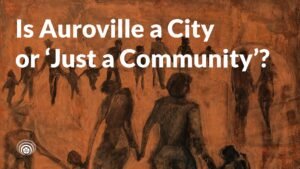Life Divine:
“Sri Aurobindo’s monumental work, ‘Life Divine,’ is divided into two volumes. The first volume, titled ‘Omnipresent Reality and the Universe,’ delves into the enigma of Ultimate Reality and its relationship to our universe composed of Matter, Life, and Mind. Sri Aurobindo critically examines various theories of Reality, harmonizing partial truths into a comprehensive perspective. He expounds on the nature of Matter, Life, and Mind, drawing from ancient wisdom and modern scientific discoveries to demonstrate their connection to the Omnipresent Reality. This connection, referred to as the Supermind, is elaborated in detail.
The second volume consists of two parts. The first part, ‘The Infinite Consciousness and the Ignorance,’ delves deeper into the nature of the Ultimate Reality as the Infinite Consciousness. A new epistemological approach, the Logic of the Infinite, is introduced and applied. The discussion extends to the nature of Ignorance, its boundaries, and its relation to Knowledge, addressing the origin of Ignorance and its connection to Infinite Consciousness through the concept of Tapas. The volume concludes by analyzing Evil, Error, and Falsehood as products of Ignorance, suggesting their potential remedy and eventual eradication.
The final part, ‘The Knowledge and The Spiritual Evolution,’ leads us to the culmination of Sri Aurobindo’s reasoning, illustrating how obscured Integral Truth can become manifest. He outlines the evolution of consciousness as a self-unfolding process, from the Inconscient to Matter, and discusses the Theory of Rebirth. This theory, along with the concept of supraphysical worlds, is explained as a mechanism for spiritual evolution. The work then envisions the further ascent from Mind to Supermind and the nature of the supramental or Gnostic Being. The final chapter anticipates the realization of a Divine life on Earth and explores possibilities for building a future ideal humanity.”
The Synthesis Of Yoga:
“Sri Aurobindo’s ‘The Synthesis of Yoga’ is organized into four parts, with an introductory section. The introduction, spanning five chapters, explores the conditions required for the synthesis of Yoga. It establishes that Yoga is aligned with Life and Nature, illustrating how Yoga optimally utilizes the energies of life. The introduction briefly touches on various yoga systems, highlighting their common principles and dynamic forces. This, in turn, leads to the development of a synthesis of Yoga.
The remainder of the book focuses on defining Integral Yoga and the necessary aids for the Integral Yoga practitioner. Each of the three paths of Yoga—Work, Knowledge, and Love—are examined within the framework of Integral Yoga. The first part, ‘The Yoga of the Divine Works,’ emphasizes the principle of self-consecration and Surrender in Works, progressing through stages of sacrifice in different aspects of life. It traces the transformation of the practitioner into a Divine Worker.
The second part, ‘The Yoga of the Integral Knowledge,’ delves into knowledge and its purification, concentration, and renunciation. It integrates the Disciplines of Knowledge into a realization of both the Transcendent and the Cosmic Self, leading to a description of the Gnosis of the Supermind and Ananda. The section briefly touches on Samadhi, Hatha Yoga, and Raja Yoga.
The third part, ‘The Yoga of Divine Love,’ discusses the role of Love in the Integral Yoga. It covers the Motives of Devotion and how they are employed in the Way of Devotion. The section also delves into the nature of Divine Delight and the Divine Personality, concluding with a profound exploration of the Mystery of Love.
The fourth part, ‘The Yoga of Self-Perfection,’ offers a detailed psychological examination of the Divine Life and integral perfection. It defines methods for perfecting each aspect of the being and the instrument of the Spirit. The Supramental faculties, Supermind, Supramental Thought, and Knowledge are elaborated upon, along with the path to Supramental Time Vision.”
Essays On The Gita:
“Sri Aurobindo’s ‘Essays On The Gita’ is presented in two series, aiming to elucidate the profound concepts found within the Bhagavad Gita and the true intentions of Lord Krishna as its Divine Teacher. The first series centers on Karma Yoga, discussing the challenges faced by individuals in the battlefield of life, the significance of Sacrifice, and the concept of Avatarhood. It emphasizes the role of renunciation and the sacrifice of desire in works as a means to attain spiritual heights, ending with a chapter summarizing the ‘Gist of Karmayoga.’
The second series, in two parts, delves into the Gita’s integral theory of Reality, which forms the foundation for the Synthetic Yoga. It explores intricate concepts such as the Two Natures of the Divine, Vibhuti, Swabhava, and Swadharma. This series reveals the secret teachings of the Bhagavad Gita and concludes with an inspiring essay titled ‘The Message of the Gita.'”
The Human Cycle:
“‘The Human Cycle’ is a work examining the psychology of social development. It presents a cyclical perspective on social progress, tracing humanity’s history from the barbaric age to the present Age of Reason and envisioning a future Spiritual Age. The book discusses concepts such as Individualism, Objectivism, and Subjectivism in Social Thought, Nationalism, and contrasts Civilization with Barbarism and Culture. It emphasizes the need for suprarational spirituality to overcome the conflicts between Aesthetic and Ethical cultures. The text also analyzes the psychology of contemporary times, pointing out the end of the Curve of Reason and the necessity of spiritual transformation. It outlines the conditions for the emergence of a Spiritual Age and how humanity will transition toward it.”
The Ideal Of Human Unity:
“‘The Ideal Of Human Unity’ is a study of communal and collective life, exploring the driving force behind it and its ultimate purpose. The book argues that nature propels humanity toward larger agglomerations, ultimately aiming for a world union. It assesses past aggregates, discusses the relationship between the individual and the group, and addresses the significance of the urge for empire-building. The text suggests the possibility of a World-State in the context of growing Nationalism and Internationalism trends. It establishes the concept of Nature’s Law of Unity in Diversity and proposes a free grouping of humanity. The book concludes by envisioning a World-State as a federation of free nationalities and includes a post-script chapter to bring the text up to date.”
The Riddle Of This World:
“‘The Riddle Of This World’ compiles Sri Aurobindo’s responses to questions regarding occult truths related to Yoga. These writings shed light on topics like Supernals, Graded Worlds, Rebirth, False Lights, and more. Some letters address matters concerning Yoga, Western Metaphysics, Agnosticism, Doubt, and Faith.”
On The Veda: “‘On The Veda’ is divided into four parts. The first part, ‘The Secret of the Veda,’ explores the hidden meaning of Vedic hymns, critiques Sayana’s theory, and examines interpretations by European Scholars. It concludes that Vedic Mantras possess esoteric meanings and spiritual knowledge, revealing the inner significance of Vedic symbols.
The second part, ‘Selected Hymns,’ provides translations of specific hymns with interpretative commentaries. The third part further elucidates the doctrine of the Mystics and includes translations of additional hymns to Agni and other deities. The fourth part presents more hymns
to the God of the Mystic Fire, Thought, Gods, and the Vedic Fire. Additionally, an appendix contains an essay addressing the origins of Aryan speech, shedding light on its historical context and development.
The Problem Of Rebirth: ‘The Problem Of Rebirth’ is a concise volume comprising three sections. The first section addresses the concept of Rebirth, examining its relationship with theories of Evolution, Heredity, Karma, and Free Will, while emphasizing its significance.
The second section delves into the complex aspects of Karma, touching on the Terrestrial Law and Mind Nature. It explores the intricate web of cause and effect in the context of human existence.
The third section extends the discussion to higher dimensions of Karma and Truth, exploring the spiritual aspects of this fundamental concept. It provides a comprehensive understanding of the broader implications of Karma within the context of human experience and spiritual growth.
In summary, these works by Sri Aurobindo offer profound insights into various facets of human existence, spirituality, and the path to self-realization. Each work provides a unique perspective and guidance for individuals seeking a deeper understanding of life’s complexities and spiritual evolution.





